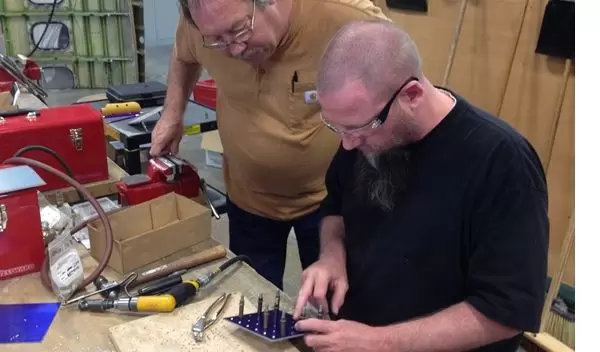
Who will do the technical jobs needed to fuel a commercial spacecraft industry?
For more than 100 years, humans have been buying airline tickets to the next best destination. Soon, that destination could be space, and space technology companies are working hard to have the first commercial spacecraft in the air.
To be space ready, they need aerospace technicians with the right credentials, and one center is situated to provide them.
SpaceTEC National Resource Center for Aerospace Technical Education is at the front end of preparing a technician workforce for this new commercial space travel.
SpaceTEC, funded by the National Science Foundation (NSF) since 2002 through the Advanced Technological Education (ATE) Program, provides resources and nationally recognized certifications for aerospace technology. It offers assessment tools and performance-based certifications to its 18 college partners, according to SpaceTEC managing director Steven Kane.
"The commercial space companies now are like the aviation industry was back in the 1920's, opening doors for entrepreneurs like Bill Boeing to take an aircraft, stretch it, put some seats in it and start carrying people," says Kane.
According to Kane, SpaceTEC saw a drop in enrollment when NASA's space shuttle program ended in 2011, but the industry underwent some retuning.
"Companies are starting to recognize that the curriculum that was created through SpaceTEC fits their needs for those technicians to start doing that work again," says Kane. And, he adds, SpaceTEC has certified about 425 technicians for this industry.
Educating a qualified workforce is part of keeping the U.S. globally competitive in this industry, according to Celeste Carter, lead program director for the ATE Program.
Creating SpaceTEC
SpaceTEC began as a way to create a national certification program that all companies would recognize. Earlier, companies conducted their own training and certification process. This meant that a technician starting a contract at a new company would have to go through training again and start at zero, no matter his or her experience.
Brian Madgett, a SpaceTEC certified examiner, has worked in the aerospace industry for over 30 years and says he knows how essential certifications are.
"It was difficult to get into the industry because there were no standardized certifications for this type of work," says Madgett.
After being certified Madgett says the technical certification gave him an edge over other applicants.
"Employers need to see the proof of your training and experience," he says.
Partnering with educators and employers
The center works with colleges, companies, government agencies and the military to ensure that the curriculum SpaceTEC created is accepted at the educator and employer levels, according to Kane.
This way, he says, educators and industry representatives have a seat at the table when the decisions are about the curriculum.
Some colleges like Eastern Shore Community College (ESCC) look to SpaceTEC to guide their program and curriculum, according to assistant professor of electronics and computer technology John Floyd.
"As a national resource center, with decades of experience relating to the shuttle program and other high profile Aerospace ventures, the partnership gives us access to information and standards that we do not have locally," says Floyd.
He also says that ESCC partnered with SpaceTEC in 2011 to prepare students for the aerospace industry and for job opportunities at the close-by NASA Wallops Flight Facility.
Government agencies like NASA make the SpaceTEC certificate a requirement in their employee contracts.
"The industry collaborations are essential to ensure that educators are producing the graduates that industry values," says Carter.
Mechanical engineering technician Kevin McLain took the SpaceTEC exam at Thomas Nelson Community College as a requirement for his NASA contract.
"I think they made it a requirement to ensure that I had sufficient knowledge of the aerospace industry and could prove to them that [I'm] serious about [my] career field," McLain says.
SpaceTEC expands to other industries
Before SpaceTEC experienced a resurgence in certifications, the center saw an opportunity to apply the same skill sets required in their certification program in other industries, such as the automobile, airline and energy industries.
So NSF granted SpaceTEC a supplement in 2009 to create CertTEC, which offers performance-based, national certifications for technical training beyond aerospace technology. It includes certifications for Basic Electricity & Electronics, Aviation Structures, Aviation Mechanical Assembly and Basic Composites. CertTEC has certified almost 1200 technicians, according to Kane.
And like SpaceTEC, the program helps students enter and move up in their industry, according to CertTEC examiner and senior instructor Kenny Payton of the Francis Tuttle Technology Center.
"Being in the aviation field for over 40 years, the training and testing baseline insures the employee has the skills that the employer is seeking, making for an easier transition into productive employment," says Payton.
A new project for veterans
SpaceTEC's newest project is VetTEC, a one-stop-shop to help veterans apply the skills they learned in the military to industry jobs.
"When they come out of the military, there's nothing really that provides industry a guide to what this person knows," says Kane.
According to Kane, the military uses skill codes, according to Kane, but they don't translate well to job postings' qualifications. VetTEC would be a tool that would let veterans input their skill code, find the certifications that fit their skills and see the jobs available for that skill set.
The project is a work in progress, but could give veterans a way into the commercial space industry, among others.
Beyond national certification, an ongoing dialogue with industry is key to SpaceTEC's success.
"The benefit of a national certification is that no matter what college teaches the information, everybody has to meet this national standard," says Kane. "In order to ensure that there's a home for these certified technicians that are created, the industry has to be involved."
